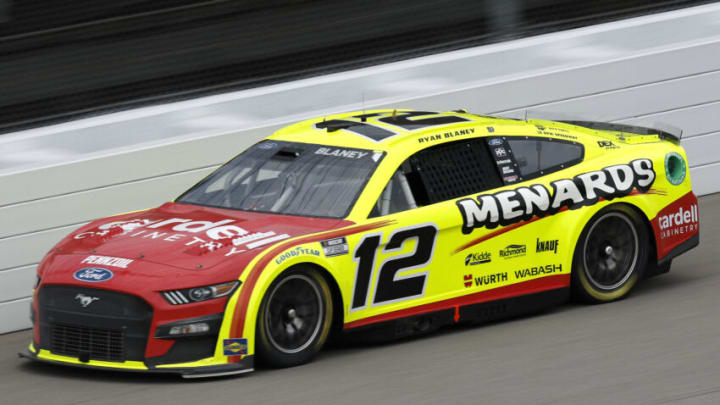The NASCAR playoff system has come under fire as of late, and that was on full display after Kevin Harvick won Sunday’s Cup Series race at Michigan International Speedway.
Stewart-Haas Racing’s Kevin Harvick became the 15th different driver to find victory lane through the first 23 races on the 2022 NASCAR Cup Series schedule when he ended a win drought of nearly two years on Sunday at Michigan International Speedway.
And his FireKeepers Casino 400 victory placed the spotlight on NASCAR’s playoff system for all the wrong reasons.
While it is hard to argue against Harvick’s worthiness of a playoff spot, considering the fact that he ranks ninth in the point standings and now has a win to his name, the focus shifted to two drivers far higher in points who may very well miss out on a chance to compete for a championship.
Team Penske’s Ryan Blaney sits in second place in the standings, yet he is the only winless driver in the provisional playoff picture in 16th, and with another new winner, he would be out.
Joe Gibbs Racing’s Martin Truex Jr. sits just one point out of third place in the point standings, yet if the playoffs started today, he would be battling for 17th as opposed to a second title.
It’s very possible that two of the top three drivers in the Cup Series could miss the playoffs.
Is it flawed? Absolutely, and there are literally thousands of combinations of potential changes to go about fixing it.
But is it fair? Unfortunately, yes, it is, given that nobody gets special treatment.
Every single driver competes under the same rules, and the playoff criteria are the same for everybody. Everybody knows that it may take a win to get in, as the 16 playoff spots go to the regular season champion and the 15 drivers who rank highest in wins.
If there aren’t enough winners to fill the spots, points determine which winless drivers make it and which don’t.
If there are too many winners, points determine which single-race winners make it and which don’t (so no, it’s not a true “win and in” system, either).
Those rules are the same for everybody.
Maybe we needed this wakeup call to finally acknowledge that. Maybe we needed this kind of a situation to create a change for which some fans have been calling for years.
Maybe now we’re paying attention.
Earlier this season, Denny Hamlin said we’d be lucky to reach 14 winners.
We hit that total with six regular season races to go.
Also earlier this season, Mike Joy refused to stop saying phrases like “win and in” and “punches his ticket” simply because a situation with more than 16 winners had never happened before.
Just because it didn’t happen before doesn’t mean it won’t happen.
And also earlier this season, fans who correctly claimed that drivers such as Austin Cindric and Chase Briscoe didn’t clinch playoff berths when they won early in the season were mocked.
Those drivers — possibly both of them — still might not make the playoffs.
Now here we are with 15 different winners and three races still to go, and don’t say we didn’t tell you so.
I don’t agree with the “if you don’t win, you don’t deserve to compete for a championship” argument either.
We usually see multiple drivers lock into the postseason without wins, and some make deep playoff runs. Tony Stewart won the 2011 championship after getting to the playoffs winless, even stating at one point that he was a waste of a spot.
But think about it this way. There are 32 full-time drivers this year. Of those 32 drivers, 15 have won this year. This means that in order to elevate yourself into the upper half of this year’s wins list, you need to win.
While it may not be right to say that a driver who consistently scores points doesn’t deserve a playoff spot, it is right to say that, in 2022, that driver may not have earned it.
Everybody knows that it may take a win. Nobody is entitled to a spot simply because they’ve run well. That isn’t part of the rules.
Again, is it right? Probably not. Is it fair? Unfortunately, yes.
And let’s not pretend that points are the be all, end all either. With stage racing, points aren’t always representative of a driver’s results. Whether stage racing is good or bad for the sport is a completely different topic for another day, but where you’re running at lap 60 of a 200-lap race shouldn’t play a role in whether or not you advance to the postseason.
Perhaps after the 2022 season, NASCAR will look to make some sort of modification to the playoff format to ensure that the sport’s top 16 drivers get the chance to compete for the championship. Then again, maybe not.
